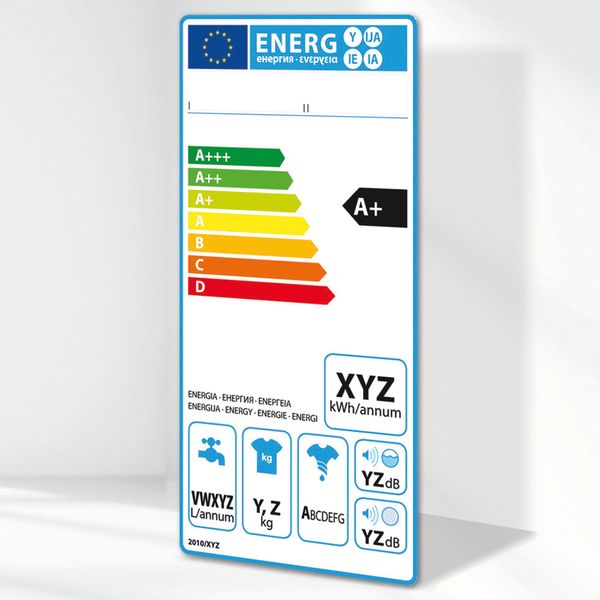The current Energy Label, which has the layout depicted since 2012, specifies the efficiency class of the relevant appliance. It also uses language-neutral pictograms to provide additional information on the appliance, such as its noise value and capacity as well as energy and water consumption. For washing machines and dishwashers, the Energy Label currently identifies energy and water consumption as annual values.

The current Energy Label for washing machines specifies three additional efficiency classes above A: A+, A++, and A+++, where energy consumption for A++ is up to 24% lower and energy consumption for A+++ is up to 32% lower than that of appliances in class A. The annual energy and water consumption in this Energy Label refers to 220 standard washing cycles per year.
Legend:
1 Energy efficiency class
2 Energy consumption in kWh/year (220 standard wash cycles/year)
3 Noise emissions during wash and spin phases expressed in dB(A) re 1 PW
4 Spin efficiency class
5 Maximum load capacity
6 Water consumption in liters/year (220 standard wash cycles/year)

The current Energy Label for washer-dryers has not been updated since it was introduced in 1996. Therefore it displays, compared to the label of other products, a scale from A to G. The calculation is based on one cycle.
Legend:
1 Energy efficiency class (complete operating cycle)
2 Energy consumption in kWh (complete operating cycle)
3 Energy consumption in kWh (wash cycle)
4 Washing efficiency class
5 Maximum load capacity
6 Water consumption in liters
7 Noise emissions expressed in dB(A) re 1 PW

The current Energy Label for dryers also shows three additional efficiency classes, A +, A ++ and A +++, above introduced by A. The best energy efficiency class, A +++, is up to 63% more efficient than class A. A ++ devices consume up to 51% less energy as class A devices. Efficiency class A + is up to 35% more efficient than class A. The calculation of the annual energy consumption is based on 160 drying cycles, using the standard cotton program.
Legend:
1 Energy efficiency class
2 Energy consumption in kWh/year (160 standard drying cycles/year)
3 Noise emissions in dB(A) re 1 PW
4 Maximum load capacity
5 Duration
6 Energy source: electricity
7 Drying efficiency class

The Energy Label for dishwashers specifies three additional efficiency classes above A: A+, A++, and A+++. The highest efficiency class with dishwashers is even up to 30% more efficient than class A. Appliances with a class A++ rating consume up to 21% less energy than class A products. The annual energy and water consumption in this Energy Label refers to 280 standard cleaning cycles per year.
Legend:
1 Energy efficiency class
2 Energy consumption in kWh/year (280 standard cleaning cycles/year)
3 Noise emissions expressed in dB(A) re 1 PW
4 Number of standard place settings
5 Drying efficiency class
6 Water consumption in liters/year (280 standard cleaning cycles/year)

In addition to the total usable volume of all freezer and refrigerator compartments, the label specifies the appliance’s noise value. The energy efficiency class is particularly important for these appliances. The better the energy efficiency class, the more energy costs can be saved - especially since these devices are in continuous operation.
Legend:
1 Energy efficiency class
2 Energy consumption in kWh/year
3 Noise emissions expressed in dB(A) re 1 PW
4 Total volume of all freezer compartments
5 Total volume of all refrigerator compartments

Beside the energy efficiency class the annual energy consumption and the noise emission are displayed. As well as the number of standard wine bottles which can be stored in the wine cooler.
Legend:
1 Energy efficiency class
2 Energy consumption in kWh/year (measured under standard conditions)
3 Number of standard wine bottles that can be stored
4 Noise emissions expressed in dB(A) re 1 PW

The Energy Label displays the energy consumption while baking in two different heating modes: with hotair or with top-/bottom heat. Beside the consumption, also the volume of the cavity is mentioned.
Legend:
1 Energy efficiency class
2 Energy source: electricity
3 Cavity capacity
4 Energy consumption in kWh/cycle (top-/bottom heat)
5 Energy consumption in kWh/cycle (hotair)

The annual use of energy is based on the assumption, that a hood is in average used 60min per day while the light is switched on in average 120min.
Legend:
1 Energy efficiency class (fan & light)
2 Energy consumption in kWh/year
3 Fan efficiency
4 Light efficiency (lightness & distribution)
5 Grease filter efficiency
6 Noise emissions in dB(A) re 1 PW






